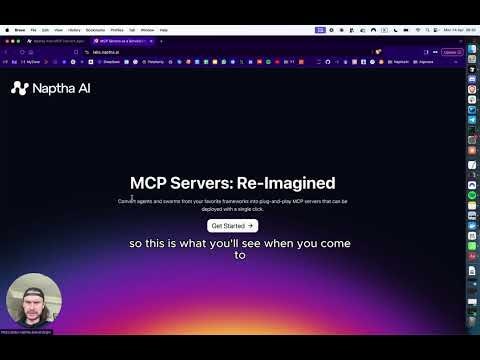
Table of Contents
Overview
In the rapidly evolving world of AI, connecting your agent-based systems to real-world applications can be a major hurdle. AutoMCP addresses this by converting your agent and multi-agent projects into fully compliant Model Context Protocol (MCP) servers. Once deployed, these servers can be discovered and invoked by any MCP-compatible client—such as Cursor or Claude Desktop—turning your AI agents into accessible, operational endpoints. Let’s explore how AutoMCP simplifies agent deployment.
Key Features
- Convert agent projects into MCP servers: AutoMCP wraps your existing agent code in an MCP-compliant server, exposing its capabilities as callable tools via the MCP interface.
- Multi-agent orchestration support: Define and deploy complex workflows where multiple agents collaborate, coordinating their actions through a single MCP server.
- MCP-compatible client integration: Out-of-the-box support for popular clients like Cursor and Claude Desktop ensures your agents are immediately usable without client-side modifications.
- Streamlined deployment framework: A unified CLI and configuration system reduces manual server setup to a few commands, shortening the path from prototype to production.
- Open-source and extensible: Built on a permissive open-source license, AutoMCP invites customization—add new transport layers, authentication schemes, or agent templates and contribute improvements back to the community.
How It Works
AutoMCP acts as a bridge between your agent logic and MCP clients. You point AutoMCP at your agent’s entry point and define a simple YAML or JSON manifest describing the tools (agent commands) you wish to expose. AutoMCP generates a server that implements the MCP schema, handling JSON-RPC requests over standard transports (stdio, HTTP/SSE, or streamable HTTP). Clients discover available tools dynamically by querying the server, then invoke agent functions by name—AutoMCP routes these calls to your agent code and returns results in real time.
Use Cases
- Local agent APIs for development: Run your agent locally as a standard MCP server, enabling rapid testing in development environments with familiar tools like Claude Desktop.
- Integrated desktop AI assistants: Embed your custom agents into desktop workflows—e.g., a data-analysis agent callable from within Cursor, or a document-review agent accessible in Claude’s sidebar.
- Collaborative multi-agent services: Deploy orchestrated agent clusters—such as research, summarization, and translation agents—that work together to fulfill complex requests via a single unified endpoint.
- Rapid AI prototype deployment: Spin up experimental agents with minimal boilerplate, iterating on agent prompts and workflows without writing server code.
Pros \& Cons
Advantages
- Guaranteed MCP interoperability: AutoMCP-wrapped agents work immediately with any protocol-compliant client, future-proofing your deployment against evolving MCP ecosystems.
- Accelerated setup: Go from agent code to production server in minutes with AutoMCP’s automated scaffolding and deployment helpers.
- Community-driven flexibility: Open-source architecture lets you extend transports, authentication, or tool-generation logic to match niche requirements.
Disadvantages
- Technical prerequisites: You still need a working agent codebase and familiarity with basic server concepts; AutoMCP does not abstract away core development responsibilities.
- Limited to MCP ecosystem: AutoMCP focuses exclusively on MCP compatibility; non-MCP clients (or legacy integration methods) require separate solutions.
How Does It Compare?
When evaluating agent deployment frameworks:
- LangChain Server offers deep integration with LangChain agents and flexible tool wiring, but requires custom server code and lacks standardized MCP schema support out of the box.
- AutoGen provides powerful multi-agent orchestration and dynamism, yet is more generalized and not specifically tailored to MCP clients.
- ReAct Agents simplify prompt-based reasoning patterns within a single LLM session but do not provide a dedicated server deployment layer for external clients.
- AutoMCP stands out for its singular focus on Model Context Protocol compliance, ensuring plug-and-play interoperability with any MCP-aware client and streamlining the journey from code to service.
Final Thoughts
AutoMCP delivers a focused, open-source solution for developers who need to expose their agent systems as MCP servers. By automating server creation, supporting multi-agent orchestration, and guaranteeing compatibility with leading MCP clients, AutoMCP accelerates the path from agent prototype to production integration. While some technical setup remains necessary and the approach is bound to the MCP standard, the framework’s specialized capabilities and extensibility make it a strong choice for any project targeting MCP-enabled AI assistants.

